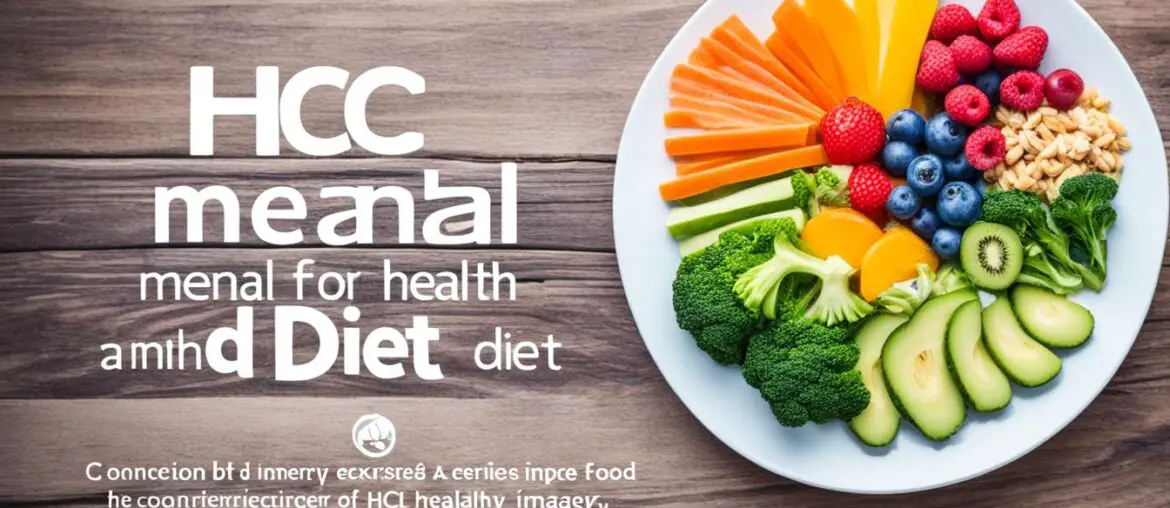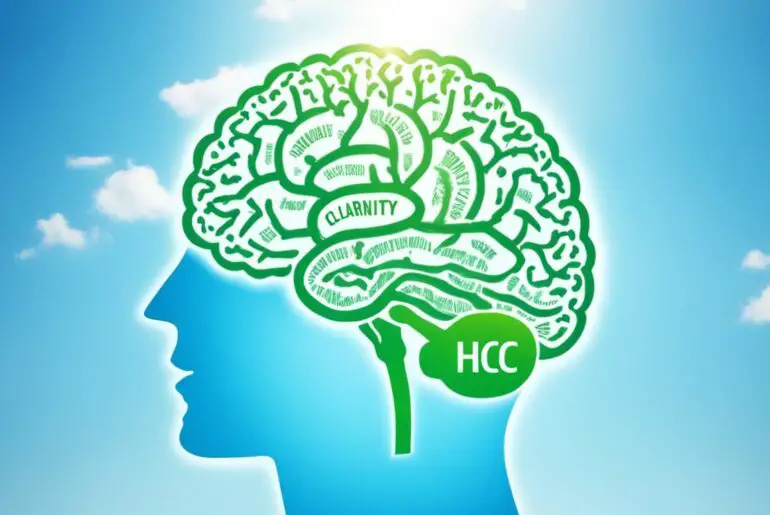Did you know that the HCG diet, often touted for weight loss, may also have an impact on mental health? This unexpected fact highlights the importance of understanding the potential benefits and risks associated with the HCG diet for mental wellbeing. While the HCG diet may seem promising, it is essential to explore safer and more sustainable methods that can provide mental health support along with weight loss.
Key Takeaways:
- The HCG diet is a topic of concern when it comes to mental health support.
- The FDA has cautioned against using HCG weight-loss products due to their potential risks.
- Severe calorie restriction in the HCG diet can have negative effects on mental health.
- Safer alternatives exist for both weight loss and mental health support.
- A comprehensive approach, incorporating lifestyle changes and seeking professional guidance, is crucial for overall wellbeing.
Understanding the HCG Diet
The HCG diet is a weight loss approach that combines severe calorie restriction with HCG hormone injections or homeopathic products. The hormone, known as human chorionic gonadotropin (hCG), is naturally produced during pregnancy and has been utilized in fertility treatments. Proponents of the HCG diet claim that the hormone boosts metabolism and facilitates weight loss.
However, scientific evidence indicates that the primary driver of weight loss on the HCG diet is the severe calorie restriction rather than the hormone itself. The strict caloric intake often falls below 500 calories per day, which is significantly lower than the recommended daily intake for most individuals. This drastic reduction in calories may induce rapid weight loss, but it can also lead to various health concerns.
The mechanism behind the HCG diet and its potential impact on weight loss is still widely debated. While some theories propose that hCG increases metabolism and targets fat stores for energy, there is insufficient scientific support to substantiate these claims. Research suggests that the significant reduction in calorie intake is the main contributor to weight loss, with the hormone potentially playing a minimal role.
It is crucial to approach the HCG diet with caution and consult a healthcare professional before undertaking any drastic weight loss programs. By understanding the mechanisms and limitations of the HCG diet, individuals can make informed decisions about their weight loss journeys and explore safer alternatives that prioritize overall health and wellbeing.
Does HCG Really Boost Metabolism and Facilitate Weight Loss?
The claim that hCG boosts metabolism and facilitates weight loss is highly debated within the scientific community. While some small studies suggest that hCG may have some impact on metabolism, larger, more rigorous studies have failed to replicate these findings consistently. The majority of scientific evidence points to the severe calorie restriction as the primary driver of weight loss on the HCG diet.
It is important to note that severe calorie restriction can have detrimental effects on physical and mental health, potentially leading to fatigue, irritability, nutrient deficiencies, and other serious health concerns. Any weight loss program should be approached with caution and under the guidance of a healthcare professional.
Additionally, the use of HCG hormone injections or homeopathic products for weight loss is not approved or regulated by the FDA. The FDA has issued warnings about the potential risks associated with using HCG weight-loss products, emphasizing that they are not proven to be effective and may carry serious health risks.
The Role of Calorie Restriction in HCG Diet Weight Loss
Severe calorie restriction is a fundamental component of the HCG diet. Advocates of the diet claim that the hormone hCG acts as an appetite suppressant, enabling individuals to adhere to the low-calorie regimen. However, the extreme restriction of calories typically consumed on the HCG diet can result in rapid weight loss, primarily attributed to water loss, muscle breakdown, and fat reduction.
It is important to note that such severe calorie restriction can have adverse effects on the body and overall health. Very low-calorie diets can lead to nutrient deficiencies, low energy levels, fatigue, muscle loss, and a compromised immune system. A balanced and sustainable approach to weight loss, incorporating adequate nutrition and regular physical activity, is generally recommended for promoting overall health and wellbeing.
| Pros of the HCG Diet | Cons of the HCG Diet |
|---|---|
|
|
Note: The HCG diet entails significant risks and is not recommended for individuals seeking sustainable weight loss or mental health support. It is important to consult with a healthcare professional before embarking on any extreme diet plan.
Safety Concerns of the HCG Diet

The Safety Concerns of the HCG Diet have raised red flags within the medical community and regulatory agencies like the Food and Drug Administration (FDA). The FDA has issued a strong warning against the use of HCG weight-loss products, indicating their potential illegality and danger to individuals’ health.
Side effects are a crucial aspect of evaluating any diet’s safety profile, and the HCG diet is no exception. Individuals following the HCG diet may experience a range of side effects that could have a significant impact on their overall well-being. These side effects include:
- Fatigue: Many users of the HCG diet report feeling excessively tired and lacking energy during the course of the diet.
- Irritability and Restlessness: Some individuals may experience mood changes, irritability, and restlessness while on the HCG diet, which can significantly affect their daily lives and relationships.
- Depression: The severe calorie restriction combined with hormonal changes may contribute to feelings of sadness and depression in some individuals following the HCG diet.
- Fluid Buildup: Another potential side effect of the HCG diet is fluid buildup, which can lead to edema and add to the overall discomfort experienced by individuals on the diet.
Furthermore, the HCG diet poses a risk of serious complications. The severe calorie restriction can lead to nutrient deficiencies, which can have detrimental effects on an individual’s health. Moreover, there is a risk of blood clots developing due to the HCG hormone’s impact on the body’s blood clotting system.
It is important to prioritize safety and consult with a healthcare professional before considering the HCG diet.
| Side Effects | Health Risks |
|---|---|
| Fatigue | Nutrient deficiencies |
| Irritability and Restlessness | Risk of blood clots |
| Depression | |
| Fluid Buildup |
Given the potential safety concerns and risks associated with the HCG diet, it is essential to consider alternative approaches that prioritize individual health and well-being. Consulting with a healthcare professional is recommended to explore safer and more sustainable methods for weight loss and mental health support.
Mental Health Risks of the HCG Diet
The HCG diet’s extreme calorie restriction can have a negative impact on mental health. Studies have shown that very low-calorie diets, such as the HCG diet, can lead to increased feelings of irritability, restlessness, and depression. The severe restriction of nutrients and energy intake can also affect brain function and mood. It is important to consider the potential mental health risks before embarking on the HCG diet.
The HCG diet, which involves consuming only 500 calories per day, can lead to imbalances in neurotransmitters and hormonal levels, which are important for maintaining emotional wellbeing. The severe calorie restriction can cause a decrease in serotonin levels, a neurotransmitter responsible for regulating mood, leading to an increased risk of depression and emotional instability.
In addition, the psychological stress of adhering to such a restrictive diet can also contribute to emotional and mental health challenges. The constant focus on food, the fear of breaking the diet, and the pressure to achieve rapid weight loss can create feelings of anxiety, guilt, and frustration.
“The HCG diet’s extreme calorie restriction can lead to increased feelings of irritability, restlessness, and depression.”
Furthermore, the limited variety of foods allowed on the HCG diet can lead to nutrient deficiencies, which can further impact mental health. Nutrients such as omega-3 fatty acids, B vitamins, and magnesium are essential for brain health and the production of neurotransmitters. Inadequate intake of these nutrients can affect cognitive function, mood regulation, and overall emotional wellbeing.
It is crucial to prioritize mental health and choose weight loss methods that are safe and sustainable. Consulting with a healthcare professional or registered dietitian can provide personalized guidance and support in finding a balanced approach that considers both physical and mental wellbeing.
Potential Mental Health Risks of the HCG Diet
| Mental Health Risks | Impact |
|---|---|
| Increased feelings of irritability and restlessness | Possible mood disturbances and reduced quality of life |
| Higher risk of depression | Potential negative impact on mental wellbeing |
| Potential nutrient deficiencies | Affects brain function and neurotransmitter production |
| Poor focus and cognitive function | Impaired mental performance |
| Increased psychological stress | Emotional instability and anxiety |
Safer Alternatives for Mental Health Support
When it comes to mental health support and weight loss, extreme diets like the HCG diet may not always be the best option. Fortunately, there are safer alternatives that prioritize both physical and mental wellbeing. By adopting a balanced diet that includes a variety of nutrients and engaging in regular exercise, individuals can achieve healthy weight loss while enhancing their mental health.
Nutrition and Exercise: The Foundation for Overall Wellbeing
A key aspect of a safe and sustainable approach to mental health support and weight loss is focusing on nutrition and exercise. A balanced diet that provides essential nutrients, such as vitamins, minerals, and antioxidants, supports optimal brain function and can help improve mood and overall mental wellbeing. Incorporating regular physical activity into daily routines promotes the release of endorphins, which are natural mood enhancers.
By prioritizing nutrition and exercise, individuals can create a strong foundation for their mental health and weight loss journey. Not only will they be nourishing their bodies, but they will also be boosting their self-esteem and confidence.
Seeking Professional Help for Effective Mental Health Support
While making lifestyle changes is important, it is equally vital to seek professional help from therapists and counselors who specialize in mental health support. These professionals can provide valuable strategies and techniques to manage stress, build resilience, and improve overall mental wellbeing.
“Engaging in therapy or counseling can offer a safe and non-judgmental space to explore and address the emotional challenges that often accompany weight loss journeys. It can provide support, guidance, and coping mechanisms to enhance mental health and ultimately contribute to successful weight management.
The Power of Support Systems
In addition to professional help, the power of support systems should not be underestimated. Connecting with others who are on a similar journey can provide encouragement and motivation. Support groups, either in person or online, offer a sense of community and a platform to share experiences, challenges, and successes. Being part of a support system can make the mental health and weight loss journey feel less overwhelming and more achievable.
Integrating Stress-Relief Techniques
Managing stress is essential for both mental health and weight loss. Stress can contribute to emotional eating, hinder progress, and negatively impact overall wellbeing. Integrating stress-relief techniques, such as mindfulness, meditation, deep breathing exercises, and yoga, can promote relaxation, reduce anxiety, and encourage a healthy relationship with food and oneself.
Celebrating Non-Scale Victories
When focusing on mental health and weight loss, it’s important to celebrate non-scale victories. Rather than solely relying on the number on the scale, individuals should recognize and appreciate other accomplishments and positive changes in their lives. Improved self-confidence, increased energy levels, enhanced mood, and a healthier body image are all non-scale victories that deserve recognition and celebration.
To sum up, prioritizing mental health support and healthy weight loss requires a comprehensive approach. By adopting a balanced diet, engaging in regular exercise, seeking professional help, building supportive relationships, incorporating stress-relief techniques, and celebrating non-scale victories, individuals can achieve sustainable physical and mental wellbeing. Remember, mental health is just as important as physical health, and taking care of both will ultimately lead to a happier and healthier life.
The Importance of a Holistic Approach

When it comes to mental health and weight loss, taking a holistic approach is essential. It goes beyond focusing solely on physical aspects and encompasses emotional and psychological factors as well. By recognizing the mind-body connection and addressing all aspects of well-being, a holistic approach can lead to more sustainable solutions for mental health support and weight loss.
Integrative strategies for holistic well-being involve incorporating various practices that promote overall health. This includes nutrition, exercise, stress management, mindfulness, and self-care. By combining these strategies, individuals can develop a comprehensive mental health support plan that addresses their unique needs and goals.
“A holistic approach to mental health and weight loss considers the interconnectedness of physical, emotional, and psychological aspects of our well-being.”
For example, rather than focusing solely on calorie restriction and intense exercise for weight loss, a holistic approach may also incorporate practices that promote emotional well-being. Mindfulness techniques, such as mindful eating, can help individuals create a healthier relationship with food and manage emotional eating patterns. This reduces the risk of using food as a coping mechanism and supports long-term weight loss goals.
The mind-body connection is a vital aspect of a holistic approach. Engaging in activities that promote mental well-being, such as yoga, meditation, or therapy, can positively impact weight loss efforts. Stress and emotional struggles are common barriers to successful weight loss. By addressing these factors, individuals can establish a more balanced and sustainable approach to weight management.
Benefits of a Holistic Approach:
- Promotes overall well-being, including mental, emotional, and physical health.
- Fosters a sustainable and balanced approach to weight loss.
- Addresses the root causes of weight gain and emotional struggles.
- Supports long-term lifestyle changes rather than quick fixes.
- Promotes self-care and self-compassion.
A holistic approach to mental health and weight loss provides comprehensive support for individuals seeking to improve their overall well-being. By acknowledging and addressing the interconnectedness of physical and mental health, individuals can embark on a journey of sustainable weight loss and improved mental well-being.
| Traditional Weight Loss Approach | Holistic Approach |
|---|---|
| Focuses primarily on calorie restriction and exercise. | Incorporates nutrition, exercise, stress management, mindfulness, and self-care. |
| Emphasizes external results, such as the number on the scale. | Emphasizes overall well-being and sustainable lifestyle changes. |
| May neglect psychological and emotional factors contributing to weight gain. | Addresses the root causes of weight gain and emotional struggles. |
| Often results in short-term weight loss followed by weight regain. | Promotes long-term weight management and improved mental health. |
Seeking Professional Guidance
When it comes to addressing mental health and weight loss, seeking professional guidance is essential. Consulting with a healthcare provider or registered dietitian can provide personalized recommendations and ensure that any approach is safe and effective. Additionally, therapy or counseling can offer valuable support in managing mental health challenges and maintaining overall wellbeing.
Consulting a healthcare provider is the first step in developing a comprehensive plan for mental health and weight loss. They can assess your individual needs, medical history, and any underlying conditions that may impact your journey. By working closely with a healthcare professional, you can create a tailored plan that takes into account your unique circumstances and goals.
“Working with a healthcare provider or registered dietitian can provide personalized recommendations and ensure that any approach is safe and effective.”
A registered dietitian can also play a significant role in supporting your mental health and weight loss journey. They have the knowledge and expertise to design a balanced diet that meets your nutritional needs while promoting weight loss. They can guide you in choosing the right foods, portion sizes, and meal plans to achieve your goals in a healthy and sustainable way.
Therapy or counseling can be instrumental in managing mental health challenges that may arise during your weight loss journey. A therapist can provide a safe and nurturing environment to explore your emotions, develop coping strategies, and address any underlying psychological factors contributing to your relationship with food. They can also offer guidance on stress management techniques and strategies for maintaining a positive mindset.
By seeking professional guidance, you are not only prioritizing your mental health but also setting yourself up for long-term success. Professionals can help you navigate any obstacles, provide ongoing support, and ensure that you have access to the resources and tools you need on your journey towards improved mental health and weight loss.
Benefits of Seeking Professional Guidance
- Personalized recommendations tailored to your unique needs and goals
- Safe and effective approaches for mental health and weight loss
- Expert guidance on nutrition and meal planning from a registered dietitian
- Support in managing mental health challenges through therapy or counseling
- Access to valuable resources, tools, and ongoing support
Comparing Professional Guidance Options
| Consulting a Healthcare Provider | Working with a Registered Dietitian | Therapy for Mental Health Support |
|---|---|---|
| Assesses overall health and identifies any underlying conditions | Designs a balanced diet tailored to your nutritional needs and weight loss goals | Provides a safe and nurturing environment to explore emotions and develop coping strategies |
| Offers personalized recommendations and treatment plans | Guides you in choosing the right foods and portion sizes | Addresses underlying psychological factors contributing to your relationship with food |
| Monitors your progress and adjusts the plan as needed | Provides ongoing support and guidance | Offers stress management techniques and strategies for maintaining a positive mindset |
Investing in professional guidance for mental health and weight loss is an investment in yourself. By working with trusted healthcare professionals, you can receive the personalized support and resources necessary to make sustainable changes for improved mental wellbeing and achieve your weight loss goals.
Lifestyle Changes for Mental Health Support

Making lifestyle changes that support both mental health and weight loss is essential in promoting overall well-being. By incorporating healthy habits, managing stress, and practicing self-care strategies, individuals can improve their mental health while working towards their weight loss goals.
Building Healthy Habits
Building healthy habits is crucial for long-term success in both mental health and weight loss. Regular physical activity not only helps in burning calories but also releases endorphins, which are natural mood boosters. Engaging in activities like brisk walking, dancing, or cycling can be enjoyable ways to incorporate exercise into daily routines.
Adequate sleep is another vital aspect of a healthy lifestyle. Getting enough restful sleep can improve cognitive function, mood, and overall well-being. It is recommended to establish a consistent sleep schedule and create a relaxing bedtime routine to optimize sleep quality.
Eating a well-balanced diet is equally important for mental health and weight loss. Incorporating nutrient-rich foods such as fruits, vegetables, whole grains, and lean proteins provides the body with essential vitamins and minerals. It is advisable to avoid restrictive diets and focus on portion control and mindful eating.
Stress Management
Stress can have a significant impact on mental health and can hinder weight loss progress. Implementing stress management techniques can help individuals maintain emotional well-being while working towards their goals. Some effective strategies include:
- Practicing mindfulness and meditation to reduce anxiety and improve focus
- Engaging in hobbies or activities that promote relaxation and stress relief, such as reading, painting, or listening to music
- Seeking support from friends, family, or professionals to help cope with stress
Self-Care Strategies
Self-care plays a vital role in maintaining mental health and supporting weight loss efforts. Taking time to prioritize self-care can provide individuals with the emotional and psychological support needed to stay motivated and focused. Some self-care strategies to consider include:
- Engaging in activities that bring joy and fulfillment, such as practicing yoga, taking baths, or going for nature walks
- Setting boundaries and learning to say no to excessive commitments or obligations
- Practicing positive affirmations and self-compassion to foster a healthy body image and improve self-esteem
Remember, lifestyle changes are most effective when they are sustainable and aligned with personal preferences and goals. Building healthy habits, managing stress, and prioritizing self-care can contribute to improved mental health and support weight loss journeys.
The Role of Support Systems

When it comes to mental health and weight loss journeys, having a strong support system can make all the difference. Support systems provide invaluable encouragement, motivation, and a sense of belonging, helping individuals stay on track and achieve their goals. There are various forms of support systems available, including accountability partners, group therapy, and online communities.
Accountability Partners
An accountability partner is someone who shares similar goals and actively supports your progress. This could be a friend, family member, or even a colleague. By regularly checking in with each other, setting goals, and sharing milestones, accountability partners provide the necessary push and motivation to stay dedicated to mental health and weight loss endeavors.
Group Therapy
Group therapy offers a safe and supportive environment for individuals to discuss their challenges, share experiences, and gain insights from others facing similar struggles. Participating in group therapy sessions allows for both emotional support and practical advice, fostering a sense of camaraderie and understanding.
“Being part of a group where everyone understands what you’re going through can make a world of difference. It helps to know you’re not alone and that others have overcome similar obstacles. Through group therapy, I discovered new strategies, gained different perspectives, and formed lifelong connections.”
– Sarah, group therapy participant
Online Communities
Online communities provide a virtual space for individuals to connect, share experiences, and learn from one another. These communities often feature forums, chat rooms, and social media groups dedicated to mental health and weight loss. Engaging with online communities allows for 24/7 support, quick access to resources, and the opportunity to connect with people from all over the world.
Whether it’s an accountability partner, group therapy, or an online community, building a support system is vital for achieving mental health and weight loss goals. The encouragement, motivation, and insights gained from others can empower individuals to navigate the complexities of their journey successfully.
The Power of Support Systems
Studies have shown that individuals who have a strong support system are more likely to succeed in their mental health and weight loss efforts. The accountability, encouragement, and camaraderie provided by support systems can boost resilience, help overcome challenges, and maintain long-term commitment.
| Benefits of Support Systems | Examples |
|---|---|
| Increased motivation and adherence | – Regular check-ins with an accountability partner – Engaging in group therapy sessions |
| Emotional support and understanding | – Sharing experiences and challenges in online communities – Receiving validation and advice during group therapy |
| Access to diverse perspectives and strategies | – Learning different approaches to mental health and weight loss from online communities – Gaining insights and tips from group therapy participants |
By harnessing the power of support systems, individuals can create a strong foundation for their mental health and weight loss journey. Connecting with others who share similar goals can provide the necessary resources, understanding, and encouragement needed to achieve sustainable results.
Mindful Eating and Emotional Wellbeing

Mindful eating practices can significantly support mental health and enhance weight management. By developing awareness of our emotions and their connection to food, we can effectively manage emotional eating patterns. Implementing mindful eating techniques, such as paying attention to hunger and fullness cues and savoring each bite, fosters a healthier relationship with food and promotes emotional wellbeing.
The Benefits of Mindful Eating for Mental Health Support
Mindful eating is a powerful tool for nurturing our mental health. It allows us to become more attuned to our body’s needs and helps us identify emotional triggers that may lead to overeating or unhealthy food choices. By practicing mindful eating, we can:
- Reduce stress and anxiety associated with food
- Improve digestion and nutrient absorption
- Promote a positive body image and self-acceptance
- Cultivate a more mindful and balanced approach to eating
Incorporating mindful eating into our daily routines can contribute to improved overall wellbeing and long-term weight management.
Practical Mindful Eating Techniques
Here are some mindful eating techniques that you can incorporate into your daily life:
- Paying attention to hunger and fullness cues: Listen to your body’s signals of hunger and fullness. Eat when you feel hungry, and stop when you feel satisfied.
- Eating without distractions: Avoid eating while watching TV, working, or scrolling through your phone. Fully focus on the food in front of you, savoring each bite.
- Savoring the flavors and textures: Take your time to enjoy the taste, texture, and aroma of each bite. Notice the sensations and appreciate the nourishment provided by the food.
- Engaging all your senses: Observe the colors, shapes, smells, and sounds of your food. Engaging all your senses enhances the eating experience and brings you into the present moment.
Practicing these techniques consistently can help you build a healthier relationship with food, improve your mental and emotional wellbeing, and support your weight management goals.
“Mindful eating is a journey of self-discovery and self-care, providing an opportunity to nourish both our bodies and our minds.”
Integrating Mindful Eating and Emotional Wellbeing
Emotional wellbeing and food are deeply intertwined. By developing a mindful eating practice, we can better understand and manage emotional triggers that may lead to unhealthy eating habits. When we approach food with mindfulness, we are better equipped to nurture our emotional needs and make conscious choices that support our mental health.
In Summary
Mindful eating is a powerful tool for managing emotional eating and supporting mental health. By developing awareness and practicing mindful eating techniques, we can cultivate a healthier relationship with food, enhance emotional wellbeing, and promote sustainable weight management.
Finding Balance and Acceptance

Prioritizing balance and acceptance in mental health and weight loss journeys is crucial. When it comes to achieving optimal well-being, it’s essential to shift the focus away from weight numbers alone and instead embrace a holistic approach that encompasses both mental health and physical wellness. This means cultivating a healthy body image and developing self-acceptance.
Healthy body image is about recognizing and appreciating the unique qualities and strengths of your body, rather than solely focusing on its appearance. It involves developing a positive relationship with your body and valuing it for its functionality and the incredible things it allows you to do.
Self-acceptance is the practice of embracing oneself, flaws and all, without judgment or criticism. It involves acknowledging and valuing your worth as an individual, independent of your physical appearance or any external expectations. Self-acceptance allows you to cultivate a sense of peace and contentment and can serve as a solid foundation for mental well-being.
Embracing a non-scale victory mindset is an integral part of finding balance and acceptance. Non-scale victories recognize progress and achievement beyond the number on the scale. They can be intangible and deeply personal, such as increased energy levels, improved mood, enhanced self-confidence, or even an overall improvement in mental well-being.
By celebrating non-scale victories, we shift our focus from external validation to recognizing and appreciating the emotional, physical, and mental gains we make along our journey.
This shift in perspective not only promotes a healthier body image but also reinforces positive behaviors and mindset, supporting long-term mental health and weight loss goals.
| Benefits of Finding Balance and Acceptance | Ways to Cultivate Balance and Acceptance |
|---|---|
|
|
Body Positivity and Mental Health
The body positivity movement promotes the acceptance and celebration of all bodies, regardless of shape, size, or appearance. It emphasizes the importance of self-love, inclusivity, and respect for oneself and others. Embracing body positivity can contribute to improved mental health by fostering a positive body image and reducing feelings of shame and inadequacy.
Remember, your mental health and well-being are just as important as your weight loss goals. Finding balance, developing a healthy body image, practicing self-acceptance, and celebrating non-scale victories are essential components of a holistic approach to mental health and weight loss journeys.
Conclusion
The HCG diet may have gained popularity for its perceived weight loss benefits, but it is important to consider the potential risks and limitations when it comes to mental health support. The FDA has cautioned against using HCG weight-loss products due to their lack of proven effectiveness and potential risks, including an increased risk of cancer.
Instead of relying on the HCG diet, it is recommended to explore safer and more sustainable approaches for both mental health and weight loss. Focusing on balanced nutrition, incorporating regular exercise, and seeking professional guidance can provide more effective strategies for achieving overall wellbeing.
Taking a holistic approach is key to long-term success. Prioritizing overall mental and physical wellbeing by considering the mind-body connection and incorporating strategies beyond weight loss can lead to more meaningful and lasting results. Remember, a comprehensive approach that encompasses mental health support and weight management is essential for overall success and wellbeing.
In conclusion, while the HCG diet may be tempting for its perceived weight loss benefits, it is not recommended as a solution for mental health support. Safer approaches, such as adopting a balanced lifestyle, seeking professional guidance, and taking a holistic approach, offer more effective strategies for achieving mental and physical wellbeing.
FAQ
Is the HCG diet effective for mental health support?
The HCG diet is not proven to be effective for mental health support. Severe calorie restriction and potential side effects of the diet can have a negative impact on mental wellbeing.
What are the safety concerns of the HCG diet?
The FDA has warned against the use of HCG weight-loss products due to their potential risks, including an increased risk of cancer. Severe calorie restriction and potential side effects can also pose serious health risks.
Can the HCG diet have a negative impact on mental health?
Yes, the severe calorie restriction of the HCG diet can lead to fatigue, irritability, restlessness, and even depression. Inadequate nutrient intake can also affect brain function and mood.
Are there safer alternatives for mental health support?
Yes, adopting a balanced diet, regular exercise, and seeking professional guidance can provide safer and more sustainable methods for mental health support and weight loss.
Why is a holistic approach important for mental health and weight loss?
A holistic approach recognizes the mind-body connection and addresses emotional and psychological factors. It promotes overall wellbeing and can lead to more effective and sustainable results.
Should I seek professional guidance for mental health and weight loss?
Yes, consulting with healthcare providers, registered dietitians, and therapists can provide personalized recommendations and support for managing mental health and weight loss challenges.
What lifestyle changes can support mental health?
Building healthy habits such as regular physical activity, adequate sleep, stress management, and self-care strategies can have a positive impact on mental health and overall wellbeing.
How can support systems enhance mental health and weight loss?
Accountability partners, group therapy, and online communities can provide encouragement, motivation, and valuable insights for navigating the complexities of mental health and weight loss journeys.
What is the role of mindful eating in mental health support?
Mindful eating techniques, such as paying attention to hunger and fullness cues and managing emotional eating patterns, can enhance the relationship with food and contribute to better mental health and weight management.
Why is finding balance and acceptance important for mental health and weight loss?
Shifting the focus from weight numbers to overall wellbeing and celebrating non-scale victories can foster a positive mindset and support long-term mental health and weight loss goals.
Can the HCG diet be recommended for mental health support?
The HCG diet is not recommended for mental health support due to its potential risks and lack of scientific evidence. Safer and more effective alternatives should be explored instead.
What are the safer approaches for mental health and weight loss?
Safer approaches include adopting a balanced diet, regular exercise, seeking professional guidance, and prioritizing overall mental and physical wellbeing.




